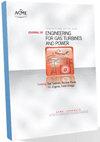Identification of Compressor Vibration Aerodynamic Forcing Mechanisms by Spectral Characteristics
IF 2.1
4区 工程技术
Q3 ENGINEERING, MECHANICAL
Journal of Engineering for Gas Turbines and Power-transactions of The Asme
Pub Date : 2023-10-06
DOI:10.1115/1.4063685
引用次数: 0
Abstract
Abstract Non-synchronous vibration (NSV) in axial compressors can be caused either by 1) unsteady aerodynamic forces that are not related to motion of the blades or 2) motion-dependent aerodynamic forcing (e.g., flutter). Aerodynamic forcing mechanisms can be challenging to identify in experimental observations of NSV because the temporal vibration characteristics for both forcing mechanisms can appear similar. This work proposes a method for distinguishing between the two mechanisms using spectral characteristics. The method provides an interpretation of experimental data explicitly consistent with the analytical models used to differentiate between forced response and flutter. Two cases of NSV were observed in a 1.5-stage axial compressor at near stall conditions. The circumferential wavenumber-dependent unsteady pressure spectra and non-intrusive stress measurement system (NSMS) spectra were observed to have distinct characteristics for the two NSV cases. Based on these distinct spectral characteristics, the first case was identified as blade-row aerodynamic forcing, while the second was identified as motion dependent (flutter). Numerical simulations confirmed low aerodynamic damping at the conditions where flutter was observed.基于频谱特性的压气机振动气动强迫机理识别
轴向压气机的非同步振动(NSV)可以由与叶片运动无关的非定常气动力或与运动相关的气动力(如颤振)引起。由于两种动力机制的时间振动特征可能看起来相似,因此在实验观测中识别气动强迫机制可能具有挑战性。本工作提出了一种利用光谱特征区分两种机制的方法。该方法提供了与用于区分强迫响应和颤振的分析模型明确一致的实验数据解释。在接近失速的情况下,在1.5级轴向压气机中观察到两例NSV。结果表明,两种非侵入式应力测量系统(NSMS)与周向波数相关的非定常压力谱具有明显的特征。基于这些明显的频谱特征,将第一种情况确定为叶片排气动强迫,而将第二种情况确定为运动相关(颤振)。数值模拟证实,在观察颤振的条件下,气动阻尼较低。
本文章由计算机程序翻译,如有差异,请以英文原文为准。
求助全文
约1分钟内获得全文
求助全文
来源期刊
CiteScore
3.80
自引率
20.00%
发文量
292
审稿时长
2.0 months
期刊介绍:
The ASME Journal of Engineering for Gas Turbines and Power publishes archival-quality papers in the areas of gas and steam turbine technology, nuclear engineering, internal combustion engines, and fossil power generation. It covers a broad spectrum of practical topics of interest to industry. Subject areas covered include: thermodynamics; fluid mechanics; heat transfer; and modeling; propulsion and power generation components and systems; combustion, fuels, and emissions; nuclear reactor systems and components; thermal hydraulics; heat exchangers; nuclear fuel technology and waste management; I. C. engines for marine, rail, and power generation; steam and hydro power generation; advanced cycles for fossil energy generation; pollution control and environmental effects.

 求助内容:
求助内容: 应助结果提醒方式:
应助结果提醒方式:


